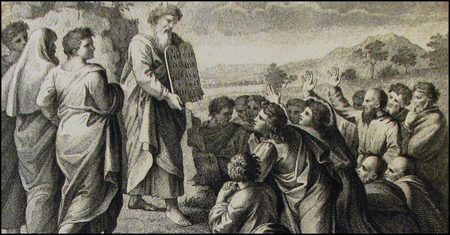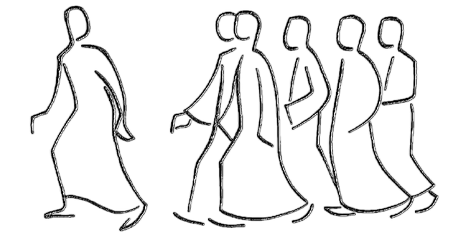Category: – The Patternists Articles
Articles written for The Patternists Facebook page
The Patternists: A Simple Demonstration of Authority
There are many who take issue with the idea that the New Testament is intended to be a pattern for the lives we live. Some consider only the words of Jesus to be authoritative (cf. John 16:5-15). Others deny the sufficiency of scripture to equip us to every good work (cf. 2 Timothy 3:16-17). Others simple view the New Testament as a love letter to men (cf. John 14:15).
Continue reading “The Patternists: A Simple Demonstration of Authority” →
The Patternists: Hold the Traditions
The apostle Paul used an interesting turn of phrase in exhorting his readers, in 2 Thessalonians 2:15, “Therefore, brethren, stand fast and hold the traditions which you were taught, whether by word or our epistle.”
His exhortation is to be a response to the calling of God. The elect of God are eligible to obtain “the glory of our Lord Jesus Christ” (14). Because of what God has done for us as Christians, and the hope we enjoy, we have a responsibility to “stand fast.”
The Patternists: What Nature Teaches Us
“The heavens declare the glory of God; and the firmament shows His handiwork. Day unto day utters speech, and night unto night reveals knowledge. There is no speech nor language where their voice is not heard. Their line has gone out through all the earth, and their words to the end of the world” (Psalm 19:1-4).
“For since the creation of the world His invisible attributes are clearly seen, being understood by the things that are made, even His eternal power and Godhead…” (Romans 1:20).
These two passages, and others like them reveal that the physical universe testifies of both the existence of God, and of certain attributes He possesses. Consider the truths we can discern from them.
Continue reading “The Patternists: What Nature Teaches Us” →
The Patternists: This Thing is from Me
Many are familiar with the rebellion of Jeroboam, leading to the division of Israel shortly after Rehoboam, son of Solomon took the throne. The events leading to the division of God’s people is recorded in 2 Chronicles 10. But, God alluded to these events in a conversation with Jeroboam in 1 Kings 11:31, when the prophet Ahijah delivered God’s message, “And he said to Jeroboam, ‘Take for yourself ten pieces, for thus says the Lord, the God of Israel: “Behold, I will tear the kingdom out of the hand of Solomon and will give ten tribes to you.”’”
Though Rehoboam played his own part in losing the northern tribes to Jeroboam, he reacted in a predictable manner to the rebellion. 2 Chronicles 11 relates Rehoboam’s assembly of an army of 180,000 chosen warriors to go and fight against Jeroboam and the rebellious tribes, “that he might restore the kingdom to Rehoboam” (2 Chronicles 11:1).
The Patternists: Conduct Yourselves in Fear
The apostle Peter, in his first epistle, emphasized the importance of living holy lives. “Therefore gird up the loins of your mind, be sober, and rest your hope fully upon the grace that is to be brought to you at the revelation of Jesus Christ; as obedient children, not conforming yourselves to the former lusts, as in your ignorance; but as He who called you is holy, you also be holy in all your conduct, because it is written, “Be holy, for I am holy” (1 Peter 1:13-16).
The text continues with a discourse on the redemption of his readers. They were redeemed with “the precious blood of Christ” (19). Christ was raised from the dead, “so that your faith and hope are in God” (21).
Continue reading “The Patternists: Conduct Yourselves in Fear” →
The Patternists: A Different Approach to Social Drinking
Full disclosure, I believe the Bible teaches that it is a sin to drink alcohol socially. I mean by that the use of alcohol in social situations such as dinners, banquets and parties, is a sinful use of alcohol. As such a Christian should not imbibe. I believe that an understanding of the English translations and the use of the term “wine” to translate the Greek and Hebrew supports my view. I believe that the Greek word (potos), used in 1 Peter 4:3 has reference to drinking socially (without respect to amount), and is condemned in that passage as sin.
However, I know that not all Christians agree with that assessment. So, I would like to take another tact to help explain the danger of drinking alcohol, or engaging in the use of other intoxicants.
There are two passages which help form the thought. The first is Proverbs 31:1-9, where King Lemuel’s mother taught him, “It is not for kings, O Lemuel, it is not for kings to drink wine, or for rulers to take strong drink…” The second is 1 Timothy 3:3, indicating that an overseer in the church is one who cannot be “given to wine…”
Continue reading “The Patternists: A Different Approach to Social Drinking” →
The Patternists: “All that the Lord has spoken”
Exodus 19 chronicles the arrival of the Israelites at Mount Sinai, where Moses was to receive God’s commandments on the mount. The Lord instructed Moses to tell the people, “Now therefore, if you will indeed obey My voice and keep My covenant, then you shall be a special treasure to Me above all people; for all the earth is Mine. And you shall be to Me a kingdom of priests and a holy nation…” (Exodus 19:5-6).
Moses relayed God’s message to the people, and they responded in a commendable fashion. “Then all the people answered together and said, ‘All that the Lord has spoken we will do…’” (Exodus 19:8). We know, of course, that they reneged on that promise many, many times through the course of their history as a nation. But, the words remain a basis of the covenant God held with them. He promised a special place for them, above all people, conditioned upon their obedience. They promised that obedience to “all that the Lord has spoken.”
Continue reading “The Patternists: “All that the Lord has spoken”” →
The Patternists: In Spirit and Truth
In John 4, the apostle records Jesus’ conversation with a Samaritan woman at Jacob’s well. She asked Him about proper worship, and asked whether the Jews or the Samaritans had it right. Her question was concerned with location. Was Jerusalem the right place? Or was the mountain located adjacent to the well the proper place to worship God?
Jesus’ answer was Jerusalem. “We know what we worship, for salvation is of the Jews” (John 4:22). More importantly, Jesus indicated an impending change, in covenant and worship. “But the hour is coming, and now is, when the true worshipers will worship the Father in spirit and truth; for the Father is seeking such to worship Him. God is Spirit, and those who worship Him must worship in spirit and truth” (John 4:23-24).
The Patternists: Turning Your Heart from God
King Solomon serves as a cautionary tale to all Christians concerning the necessity of staying true to God’s will. Most are aware that Solomon began his reign as King of Israel in a commendable way, as a young man asking God for wisdom, that he might be a capable king. We are told, “And God gave Solomon wisdom and exceedingly great understanding, and largeness of heart like the sand on the seashore”; and “he was wiser than all men” (1 Kings 4:29,31).
Solomon built a temple to the Lord and placed the ark of the Lord in it. At the dedication of the temple, Solomon prayed, saying “Lord God of Israel, there is no God in heaven above or on earth below like You” (1 Kings 8:23).
Continue reading “The Patternists: Turning Your Heart from God” →
The Patternists: Parental Responsibility
The Virginia gubernatorial election became national news a couple of weeks ago, as the two candidates expressed sharp disagreement on the part that parents should play in the education of their children. The Republican candidate, Glenn Youngkin said, “I believe parents should be in charge of their kids’ education.” The Democrat candidate, Terry McAuliffe said, “I don’t think parents should be telling schools what they should teach.”
Continue reading “The Patternists: Parental Responsibility” →
The Patternists: Transgressions Bring Judgment
The book of Amos begins with declarations of judgment against various nations. The form of the declarations is uniform, beginning with the phrase, “for three transgressions… and for four.” For example, “Thus says the Lord: ‘For three transgressions of Damascus, and for four, I will not turn away its punishment, because they have threshed Gilead with implements of iron” (Amos 1:3). Also included are declarations against, Gaza (1:6), Tyre (1:9), Edom (1:11), Ammon (1:13), Moab (2:1), Judah (2:4) and Israel (2:6).
These simple declarations reveal why God’s judgment comes upon any people, either collectively or individually. They come because of transgressions. The Hebrew word in this context (pesa) is translated in the Old Testament using words like, transgression, sin, trespass and rebellion.
Continue reading “The Patternists: Transgressions Bring Judgment” →
The Patternists: Departures from Christ
The second and third chapters of Colossians serve to warn us of the danger of departing from Christ and His will for man. Paul states that in the “knowledge of the mystery of God, both of the Father and Son” are “hidden all the treasures of wisdom and knowledge” (2:2-3).
Does that mean the Bible contains all truth? No. But it does contain all the truth that pertains “to life and godliness” (cf. 2 Peter 1:2-4). As Paul wrote, “All Scripture is given by inspiration of God, and is profitable for doctrine, for reproof, for correction, for instruction in righteousness, 17 that the man of God may be complete, thoroughly equipped for every good work” (2 Timothy 3:16-17).
Continue reading “The Patternists: Departures from Christ” →
The Patternists: He Cannot Be My Disciple
In Luke 14:28-32, Jesus taught two parables about counting the cost. A man should count the cost of building a tower, so that he doesn’t run out of money before it is finished. A king should count the cost before going to war against an army twice the size of his own, so that he is not defeated in his efforts.
The two parables show the importance of counting the cost before making an important decision. Jesus taught the parables to make a point about discipleship.
Continue reading “The Patternists: He Cannot Be My Disciple” →
The Patternists: Are You Honest? Or a Liar?
Let me ask you a question. “Do you know God?”
“You do? Wonderful! But, can I trust your answer? Do you really know God? You aren’t lying, are you? Can you prove that you really know God?
The above conversation would anger some, unsettle others. I understand that many would take offense at being asked such a question, and then having their affirmative response questioned or challenged. But, consider the following words from the pen of John the apostle.
“Now by this we know that we know Him, if we keep His commandments. He who says, “I know Him,” and does not keep His commandments, is a liar, and the truth is not in him. But whoever keeps His word, truly the love of God is perfected in him. By this we know that we are in Him. He who says he abides in Him ought himself also to walk just as He walked” (1 John 2:3-6).
Continue reading “The Patternists: Are You Honest? Or a Liar?” →
The Patternists: Building on the Sand
My grandson (2 years old) loves to have his Granna sing the wise man/foolish man song to him. Lately, each time he visits he goes directly to the giant LEGO blocks we have for the grandkids to play with, to get Granna to build a “house” for him to demolish when she gets to the words, “And the foolish man’s house went, SPLAT!” (Giggle, giggle, then do it all again).
Jesus’ words in Matthew 7:24-27, paraphrased in the song, teach significant truths that both children and adults need to learn. Consider what Jesus said:
“Therefore whoever hears these sayings of Mine, and does them, I will liken him to a wise man who built his house on the rock: 25 and the rain descended, the floods came, and the winds blew and beat on that house; and it did not fall, for it was founded on the rock. 26 But everyone who hears these sayings of Mine, and does not do them, will be like a foolish man who built his house on the sand: 27 and the rain descended, the floods came, and the winds blew and beat on that house; and it fell. And great was its fall.”



















